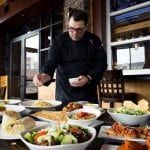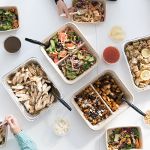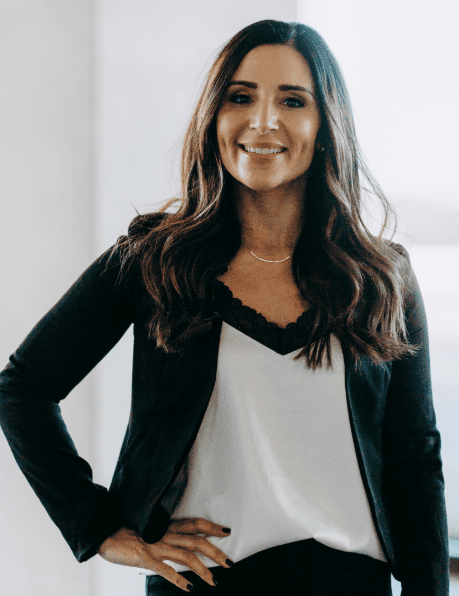The Catering Feed is now available on iTunes, Spotify, and Google Podcasts.
At ezCater, we want to help restaurants grow a successful catering business. Whether you’re in the early stages of building a business or an industry veteran, let us help you dip into the $61.5 billion catering market. In each episode of “The Catering Feed,” we talk to restaurant industry leaders of thriving brands who share insights and tactics to ramp up your catering business.
How does a restaurant vision come to life? In this podcast, we go inside the minds of CoreLife Eatery’s President, Scott Davis, and Director of Off-Premise Business, Nicole Jackson. Scott and Nicole talk about the different phases of developing a successful restaurant concept, from creating a menu to engaging customers at different touchpoints.
Scott Davis is President of CoreLife Eatery and has spent nearly forty years in the restaurant industry. He formerly served as Chief Concept Officer and Executive Vice President for Panera Bread and also worked at Au Bon Pain and Carrols Corporation, which owns and operates over 800 restaurants under the Burger King brand.
Nicole Jackson is CoreLife Eatery’s Director of Off-Premise Business. She’s spent the past decade leading sales teams and growing the catering business of brands including Boston Market and Panera Bread.
The Catering Feed is now available on iTunes, Spotify, and Google Podcasts.
Want to attract new catering customers?
TRANSCRIPT:
Genenvieve Babineau: Welcome to The Catering Feed: The Catering Growth Podcast. A show about growing your catering business and restaurant industry trends. Powered by ezCater.
Hi everyone, welcome to the podcast. A show about building successful restaurants, catering, and trends in the restaurant industry. I’m your host, Genevieve Babineau, and I’m here today with Scott Davis and Nicole Jackson from CoreLife Eatery. Scott is the President and Chief Concept Officer and Nicole is the Director of off-premise at CoreLife. The two of them have been a fearless duo who worked together both first at Panera, and now are really taking on the catering program at CoreLife. So I’m so happy to have you both. Thank you so much.
Scott Davis: Thank you.
Nicole Jackson: Absolutely
Genevieve Babineau: You two have known each other for a very long time, and you’ve collaborated and partnered together with two different concepts now, so I would love if you could share a little bit about how you met and how you’ve come together as a duo for the past decade or so.
Nicole Jackson: Absolutely. So I actually had the honor of meeting Scott many, many years ago at Panera Bread. I was hired with the company as an assistant manager and I was working in our Cicero location. And Scott used to come in with his kids and get smoothies when they were little. So I remember it very fondly and we’d have great conversations. And as my role continued to evolve with the company, Scott and I worked together on some product testing over the years as well.
Scott Davis: So Nicole’s being very modest about this.
Genevieve Babineau: Per usual.
Scott Davis: So I used to come in with my kids, there were like five, six years old at the time, and they were, they were the original Smoothie Kings. They just walked in like they owned the place and Nicole always would make sure that they got taken care of. And it was a lot of fun, you know, having her in the market where I was living and sort of watching her evolve over the years as we built up a catering program and really use Syracuse to help drive it home, so we’ve got a lot of history.
Genevieve Babineau: And your roles have changed a little bit since then, right?
Scott Davis: A little bit. We’re both at a whole different company now and I’m the president of CoreLife Eatery, Nicole’s really running our whole catering program for us. So she’s in a similar role but she’s the whole role now.
Genevive Babineau: She’s the Wonder Woman of catering at CoreLife.
Scott Davis: Absolutely, yup.
Genevieve Babineau: Awesome. Well before we get into talking about building concept and that journey all the way to sales and the customer touchpoint, I would really love to talk about some of the big news trends these days. We’re hearing that FedEx is partnering with Pizza Hut and some other retail locations to build a robot that delivers. So I would love to hear your take – what is up with all of this automated delivery. What’s your thoughts on it?
Scott Davis: Well you know it’s funny but every, every conference I go to and every time I’m sort of around a bunch of restaurant folks, the topic always turns to some sort of technology automation – the drones are gonna be delivering our pizza. And you know it’s funny because every once in a while you say, you know I just wanna talk about food again.
Genevieve Babineau: Right?
Scott Davis: And so it’s kind of crazy but I mean it seems to be the topic everywhere you go. Everyone wants to talk technology.
Nicole Jackson: Yeah, it’s like there is always something you didn’t know you needed.
Genevieve Babineau: And it’s funny too because I know at CoreLife you’re really focused on mindfulness, but you’re also very dependent on technology to allow you to automate certain processes. So where do you see that balance between automation and connection?
Scott Davis: Sure, so you know with our, we’re starting a catering program as we speak. We’ve been rolling it out and you know, but that’s come from a couple of years of being up operating and getting a lot of requests from folks who are looking for catering type of offers or orders, right? And one of the things that we found was, which is interesting is, that a lot of folks out there looking for wellness, not you know, healthy food, but also a bit more wellness experience. So one of the things that we’ve been sort of playing around with is this idea of meal and a mat. So there are occasions where we’ll actually come in with a catering order and we’ll have pre-arranged it to have like, a yogi or someone who could actually hold, like a little class, you know, think about like 15 minutes of mindfulness in the middle of your big training seminar right. It’s a way to sort of bring a little bit of the sexier lifestyle of some places like Facebook and Google and you know what you think about as these cool places the work, it’s way to bring a little that and with your catering order. And we’re finding that’s already starting to be something of interest for different folks out there.
Nicole Jackson: It’s another level for us to, another way for us to provide an experience you know and it’s funny because when you look at technology and how it can arm you, right, it really can add valuable information and having it all in place to really effectively manage your client relationship, you know? But I think for us one of our focuses is how do we bring that experience to the next level? So how do we use technology, our CRM for example, to really organize our client information so that you know we can reach out to them with things that would be interesting to them?
Genevieve Babineau: And I think that key is really when technology and automation – when it’s able to automate processes that otherwise distracted from experience, from the customer relationship – let us get back to what we love doing which is running restaurants, bringing great customers, phenomenal catering. And so, I think it’s just so cool when you hear of things about Fedex because it’s always interesting to see where these trends are going. But it sounds like from what I hear from the two of you, that you gotta get to basics and if technology is enhancing that experience and connection, well then that’s where the magic is.
Nicole Jackson: Absolutely. And I think that’s really the intention of it, right? I mean technology is really meant to simplify, and simplify so that we can get back to doing what’s really important which is connecting and providing that amazing experience for people.
Genevieve Babineau: And I think what you have done at CoreLife is all about connecting and I think you can see that honestly through your menu.
Scott Davis: That’s great. I think that the personalization, the connection, and the personal touch – you know, technology is important but I think you know, you see more, I think you’ll see some people try to make it a facing forward, you know part of their business. For us is probably more of a back, not to say backfacing but really supporting element that then allows us to be making the human contact, easier, and more thoughtfully. So I think that’s for us how we see that all playing out.
Genevieve Babineau: And allowing you to really scale your operation.
Scott Davis: Yeah, no, exactly. When you do a scratch recipes it’s great to be able to do that in the backroom, but then have somebody on the front talking to you about your allergies and which food you want and which food you don’t want. So it works both ways.
Genevieve Babineau: Everything in balance.
Scott Davis: That’s right.
Genevieve Babineau: Well, you know I would love to hear, you’ve worked for some pretty phenomenal brands. I think when people think of catering, Panera is one of those first brands that comes to mind and you were the Chief Concept Officer there. Can you talk about both at Panera and now the wonderful work you’re doing at CoreLife: how do you evolve that brand essence from an “inside the four walls” concept to off-premises?
Scott Davis: Gosh well, you know it sort of starts with listening to your customer all the time and everything always does, right? So for us you know, back in the early days at Au Bon Pain, it was a very simple sort of program where basically it was admins we were feeding and we were actually servicing, who were feeding then, you know, their bosses and their clients, and that sort of evolved into more of a sales driven sort of program and today we’re seeing that plus we’re seeing a lot more sort of wellness coordinators trying to feed larger groups of folks. So it’s been an evolution of the brands and of the sort of ways people use those brands over time and it’s interesting to see people getting healthier and more particular as the years go by.
Genevieve Babineau: Nicole, can you talk a little bit about how your approach to relationships has evolved over the years at these different brands.
Nicole Jackson: Absolutely, I think it’s not really as evolved, Genevieve, but I would say in a lot of ways it’s remained the same. I think at the core, it really needs to be about understanding what’s important to people so that you can really solve for their need. And make a lasting connection with them to continue to do that over time. And so really I think a couple of things, as I moved brands, I think it’s really about understanding what we can offer that solves for the current needs of those folks that are going to be ordering today. You know at CoreLife, one of the things that we’re really excited about is we can bring really amazing food that’s also going to leave, you know, their attendees or their clients feeling really great too. So that’s something we’re certainly excited about.
Genevieve Babineau: I think that’s such a key trend right now, right? We’re starting to think not just about how does the food that we eat day to day really fuel our bodies, the food that we eat in a restaurant, but now as you’re taking this food off premises, how do you maintain that commitment? I think it’s a really tough thing but consumers are craving it.
Nicole Jackson: Yeah absolutely. You know, it’s funny. So whenever I would travel for you know, professionally in the past, it’s always one of those things where you go away to a conference or a meeting and you know that you’re throwing your way meeting out the window, right, during lunch or dinner?
Genevieve Babineau: Oh I’m going to regret this.
Nicole Jackson: Yeah, right?
Scott Davis: It doesn’t count if it’s not at home.
Nicole Jackson: You know there’s gonna be pizza for lunch, which you know, I do like pizza, but, when you think about that, when you’re the decision maker of the order for catering, you know, you really have to consider the needs of your group. And our goal has really been to, to enable them to do that without adding any extra work for them and still providing something for everyone. So you know you may have three people that maybe have dietary constraints or a certain way of eating but everyone is going to love the meal and that’s really our goal.
Scott Davis: Yeah exactly. And you know it’s a tricky business because in today’s world, people are so much more sensitive to what they’re eating, where it’s coming from. It’s not like the old days where you could just lay out a whole big tray of sandwiches and be done. People want to know, is that steak grass fed, is the chicken antibiotic free, is there gluten in this meal or not? I mean so, being well armed with that stuff in today’s world is really important especially in the B2B side of catering.
Genevieve Babineau: Do you think a lot of those trends whether it’s paleo, primal, keto, plant based – which trends do you see having more of a life to them and they’re kind of here to stay, this is a new way of thinking, and which ones do you see maybe as a passing trend? Like where’s that balance?
Scott Davis: Yeah. Usually from my experience anything that’s extreme one way or the other, probably is a fad. If it means you stop eating a whole food group, probably not going to be around a long time. So you know we tend to look at more sort of eating in moderation, eating cleaner. I think there’s all different sorts of modalities of eating and some things work for some people, some things don’t work for some people, and I think the idea is creating your own sort of version of what works for you today. I think there’s a lot more knowledge out there and I think it really provides us an opportunity to help people understand what makes them feel better. You know because you’re in a big meeting, two o’clock in the afternoon, you don’t want people falling asleep after eating this big meal, you want them energized and that’s our other side, we want to give you the power to take your meeting to a whole other place.
Nicole Jackson: So and I think one other thing I would add to that is, you know our goal is really inclusivity, right? And so if you’re ordering catering, you want to be mindful again of your group. And so I think you know when you think about vegetarian, vegan, making sure that everyone is included in that meal. So our approach has really been a Whole Foods approach which lends to so many different ways of eating. So it’s not necessarily we have to align with one over the other because, as you know, as Scott pointed out that some may be here to stay and some may not. But I think taking that Whole Foods approach is going to allow us to really capture all of the audience and be able to deliver on what their needs are.
Genevieve Babineau: Plus that common denominator is customization. And whether certain fads are going to stay or maybe kind of fizzle out, I think the main thing is that when you eat in a restaurant or at home, you get to make sure that what you’re consuming is really what you want versus previously with catering it was kind of, here’s what’s for lunch and take it or leave it.
Scott Davis: Hold the onions please.
Genevieve Babineau: Exactly. So since this is such a personal mission for you and you’ve seen how this has affected so many of your customers and your catering clients, how do you decide when certain menu items just get the cut, get 86’d? Do you have certain dietary or nutritional expectations for everything that’s on your menu?
Scott Davis: Well you know usually it’s about popularity. If something’s not selling, I’m going to be told by the operators long before customers usually, “get it out of here.” So that’s been something that’s been forever.
Genevieve Babineau: Right.
Scott Davis: So it doesn’t really matter where you’re at. If it’s not selling, no one wants it. So there’s that. But ultimately what you got to be looking for is what resonates for people, what are people keep coming back for? If you have an LTO, is this one of the things that when they take it away, they’re mad at you?
Genevieve Babineau: Right.
Scott Davis: That’s a good sign. I remember doing a strawberry poppy seed salad at Panera a long time ago. It was like, first year it went off the menu because of seasonality, it was like, it was gonna be a riot. And you know to our credit, we said, “You know what, let’s just leave it off, we’ll bring it back.” And you know, it’s funny because every year that thing built more popularity because we took it away. If we’d left it there, it would eventually have sort of would have tanked and sort of been an okay also ran. You know but bringing people in and out of something sometimes can really help.
Genevieve Babineau: I think as a duo it’s such a cool concept because everywhere from ideation of brand concept, what the ideals for the brand would be, how that evolves into a true vision, all the way then to, Nicole when you and your team are right in front of a catering customer. I think the two of you get to really look holistically at this whole journey. So how do you try to bring that menu to life for your clients when you’re connecting with them?
Nicole Jackson: That’s a great question. You know it’s, it’s funny because it all really starts with how Scott sees it in his head and really how he envisions the concept.
Scott Davis: It’s a dangerous place.
Nicole Jackson: And then you remember one of our first conversations, you know him kind of explaining what his thoughts were to me and then he’s like, now does that work? Right, like does that work for catering clients, or can we sell that, right? And so I think it’s understanding, you know, does it resonate with everybody, does what we want to do or what we think is going to be the concept, does it really resonate with everyone and is it going to help drive our business in itself or their need? Right so, I think that’s really been our goal. It’s been interesting to partner and to see that and just to see kind of his creative process and how all of that comes to life.
Genevieve Babineau: How do you use catering to create an experience for your customers?
Nicole Jackson: Many different ways, Genevieve. I think everything from onboarding a new client, you know finding a prospective client and getting to know them, you know, understanding who they are and what they do for the organization and what’s important to them. I think that’s a really big part of the experience, right? Showing that we are really invested in their success around this event is really key. The other piece obviously is operational execution, right? Executing the meal, delivering the meal, and meeting their expectations, or exceeding them is really the goal. And then staying connected with them. You know, hopefully the beginning we did a good job of understanding who they were and what the opportunities were, so that we can continue to service them all year long and for many years to come.
Genevieve Babineau: The two of you have such an alignment in the way you collaborate with each other it’s clearly you’re an extension of each other. It’s really incredible for our listeners to be able to hear your journey and how much the two of you have evolved over your own careers but you’ve really built both concepts and catering programs at some pretty phenomenal concepts. And so I’m so grateful that you were able to join us today. Thank you so much.
Scott Davis: You’re welcome. It’s been great.
Nicole Jackson: Thank you.
Thanks for listening to The Catering Feed, powered by ezCater.









